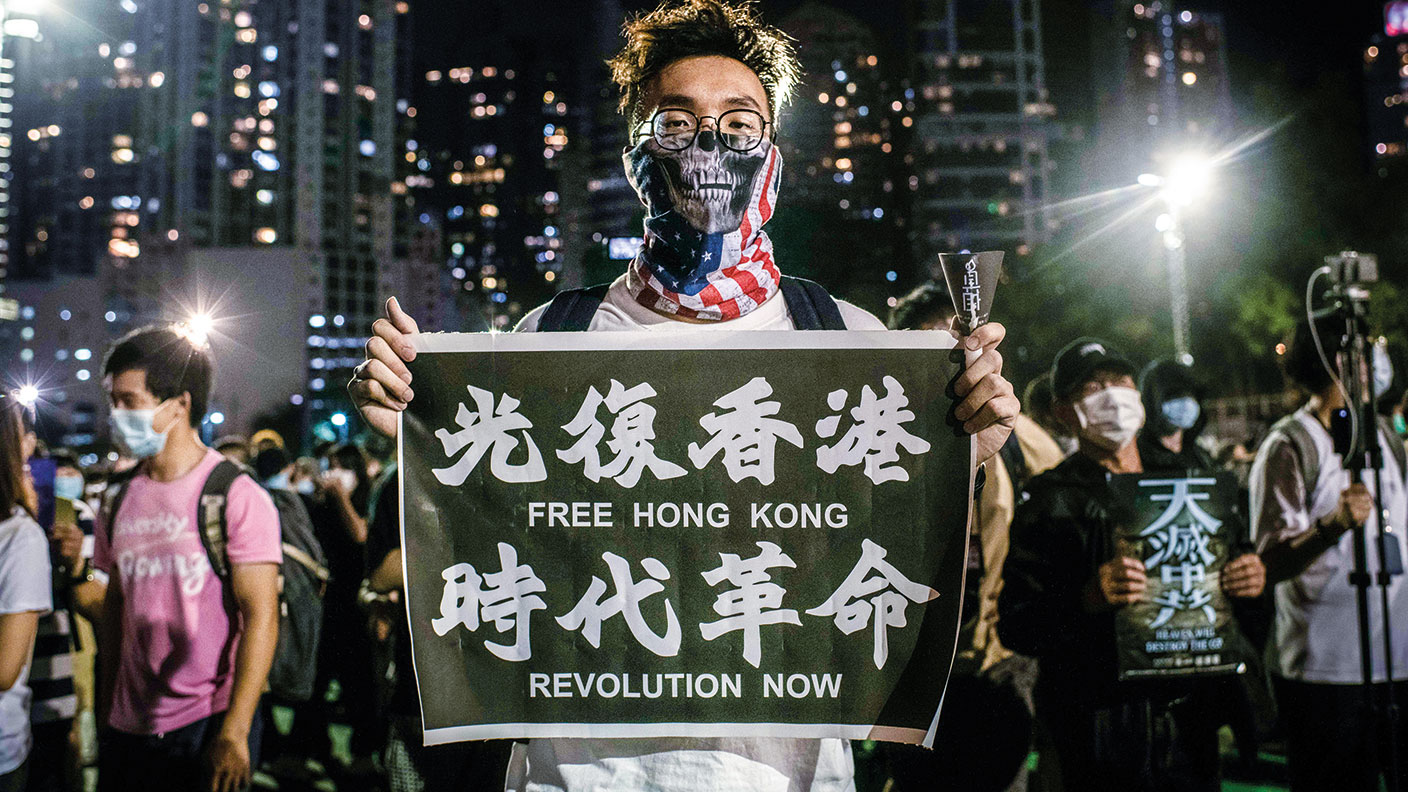The tug of war over Hong Kong
China’s move to take more control over Hong Kong could lead to deeper civil unrest and imperil its role as a global financial centre.

Get the latest financial news, insights and expert analysis from our award-winning MoneyWeek team, to help you understand what really matters when it comes to your finances.
You are now subscribed
Your newsletter sign-up was successful
Want to add more newsletters?

Twice daily
MoneyWeek
Get the latest financial news, insights and expert analysis from our award-winning MoneyWeek team, to help you understand what really matters when it comes to your finances.

Four times a week
Look After My Bills
Sign up to our free money-saving newsletter, filled with the latest news and expert advice to help you find the best tips and deals for managing your bills. Start saving today!
What has happened?
At the end of last month China’s rubber-stamp parliament, the National People’s Congress, approved a new draft national security law for Hong Kong. The details have yet to be published, but its stated aim is to prohibit “splittism, subversion, terrorism, and any behaviour that gravely threatens national security and foreign interference”. It would be the first time that a law from the mainland, carrying criminal penalties, has been introduced into Hong Kong’s semi-autonomous legal code. Hongkongers would have no say in the matter and the law (it is widely feared) would end the independence of Hong Kong’s judiciary. As such, many Hongkongers believe it would kill off the “one country, two systems” model that has protected the territory from the worst aspects of Beijing’s authoritarianism since 1997.
What’s the background?
From last June until the onset of the coronavirus crisis in January, Hong Kong was gripped by violent protests over an extradition law (since withdrawn) that many feared would be used by Beijing as a tool to suppress dissent. The new proposed law, it is widely presumed, would be far worse – facilitating the mass arrest of pro-democracy campaigners on trumped-up political charges, and giving free rein to the mainland’s security forces to crush dissent. It’s not yet known exactly how the law will be framed, but it’s hard to avoid the conclusion that it will harden positions on both sides, leading to deeper civil unrest. The new law means that Hong Kong “could be a simmering centre of revolt for years”, says James Palmer in Foreign Policy. “This summer could see violence – mostly at the hands of the police, but some by protesters – on a scale that dwarfs last year’s protests.”
How will that affect business?
The US response to the law – to declare that it will no longer treat Hong Kong as a meaningfully autonomous territory – has amplified the sense that the territory’s status as a global financial hub is now in real peril. The underlying purpose of the national security law is to accelerate Hong Kong’s absorption into mainland China, whereas the great attraction of the city for global businesses is that it provides a bridge into China – but with financial and legal systems that are far more transparent and credible. That’s a tension that may ultimately be impossible to resolve. And on a practical level, the prospect of increased security issues and ongoing chaotic protests make it a much less attractive place to live for wealthy foreigners – not to mention the prospect of potential arrest on vague national security grounds (like the two Canadians held by Beijing since 2018 in retaliation for the arrest, in Canada, of Huawei’s Meng Wanzhou).
MoneyWeek
Subscribe to MoneyWeek today and get your first six magazine issues absolutely FREE

Sign up to Money Morning
Don't miss the latest investment and personal finances news, market analysis, plus money-saving tips with our free twice-daily newsletter
Don't miss the latest investment and personal finances news, market analysis, plus money-saving tips with our free twice-daily newsletter
How important is Hong Kong?
It’s the world’s third-biggest financial centre, after New York and London. And as global power and wealth pivots towards Asia, Hong Kong is crucially important to global markets as the biggest Asian financial hub, and a unique conduit between China and the West. Already Hong Kong has the fourth-biggest stockmarket in the world (bigger than London’s), listing nine of China’s ten biggest companies and international ones, too (though the proportion of mainland firms has risen fast in recent years, now accounting for 75% of overall market capitalisation). Crucially, Hong Kong is by far the pre-eminent dollar-funding centre in Asia. Some $9.7trn of cross-border financial claims, such as loans, are booked in Hong Kong. And around $10trn of dollar transactions flowed through its bank-to-bank payments system last year. Some 420 hedge funds (80 more than Singapore) are based there, managing more assets ($91bn) than Singapore and Japan combined. It’s also home to the global or regional HQs of 1,500 international companies.
How are they reacting?
Some banks are busy negotiating a very delicate tightrope. Last week HSBC (UK-listed but founded in Hong Kong in 1865) and Standard Chartered bowed to pressure from China to say they supported the security law; as a result they have faced opprobrium from politicians and commentators in the UK. “Yet the idea that international banks such as HSBC and Standard Chartered can publicly defy the laws of the countries in which they operate, and still expect to thrive, is naive in the extreme,” says Jeremy Warner in The Daily Telegraph. Meanwhile, behind the scenes, many global banks, fund managers and financial services firms have been quietly examining exit strategies for months, says George Hammond in the Financial Times. Hedge funds are being discreetly induced to relocate by the like of Singapore and Tokyo.
What will happen?
Although the Hang Seng stock index fell following China’s announcement, for the time being there’s no sign of capital flight. Investors are reassured by Hong Kong’s $440bn of foreign reserves and long history of stable financial management. In terms of Hong Kong’s future as a global hub, much will depend on how the fracturing relationship between the US and China evolves. But for now there is no sign of the US resorting to its nuclear option – imposing sanctions or restrictions that would stop Hong Kong officials, banks or firms from using the dollar. Yet plenty of executives at mutual funds, multinationals and banks are mulling relocating away from Hong Kong. For them, there will be two key measures to assess as the security law is imposed, says The Economist. First, will the US target the dollar-payments system, “which has the potential to cause an immediate scare”. And second, will the communist party attempt not merely to suppress dissent and intimidate foreign critics, but also to compromise Hong Kong’s institutions – its courts, independent judiciary, central bank and financial regulators. “If it fails these tests, its time as a global financial centre really will be up.”
SEE ALSO:
Get the latest financial news, insights and expert analysis from our award-winning MoneyWeek team, to help you understand what really matters when it comes to your finances.
-
 How to invest as the shine wears off consumer brands
How to invest as the shine wears off consumer brandsConsumer brands no longer impress with their labels. Customers just want what works at a bargain price. That’s a problem for the industry giants, says Jamie Ward
-
 Why annuities are back in fashion for retirees
Why annuities are back in fashion for retireesThe appeal of annuities has been boosted by higher interest rates. So should you buy an annuity with part of your pension savings?
-
 UK wages grow at a record pace
UK wages grow at a record paceThe latest UK wages data will add pressure on the BoE to push interest rates even higher.
-
 Trapped in a time of zombie government
Trapped in a time of zombie governmentIt’s not just companies that are eking out an existence, says Max King. The state is in the twilight zone too.
-
 America is in deep denial over debt
America is in deep denial over debtThe downgrade in America’s credit rating was much criticised by the US government, says Alex Rankine. But was it a long time coming?
-
 UK economy avoids stagnation with surprise growth
UK economy avoids stagnation with surprise growthGross domestic product increased by 0.2% in the second quarter and by 0.5% in June
-
 Bank of England raises interest rates to 5.25%
Bank of England raises interest rates to 5.25%The Bank has hiked rates from 5% to 5.25%, marking the 14th increase in a row. We explain what it means for savers and homeowners - and whether more rate rises are on the horizon
-
 UK inflation remains at 8.7% ‒ what it means for your money
UK inflation remains at 8.7% ‒ what it means for your moneyInflation was unmoved at 8.7% in the 12 months to May. What does this ‘sticky’ rate of inflation mean for your money?
-
 Would a food price cap actually work?
Would a food price cap actually work?Analysis The government is discussing plans to cap the prices of essentials. But could this intervention do more harm than good?
-
 Is my pay keeping up with inflation?
Is my pay keeping up with inflation?Analysis High inflation means take home pay is being eroded in real terms. An online calculator reveals the pay rise you need to match the rising cost of living - and how much worse off you are without it.